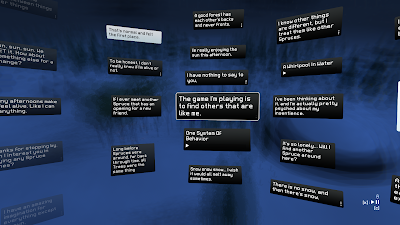 |
| Just a polar bear rolling. You know, as they do. |
And there's the real point. Everything is the most deliberately and self-consciously philosophical game I have yet to play. Although serviceable, the gameplay and graphics have an almost deliberately unpolished look; animals aren't even animated, but move in a sort of herky-jerky rolling. I don't like to impute sinister motives to creators, but the style of the game seems like a deliberate attempt to give the impression of the game as being an "art piece", like the developers had more important things on their mind than merely making a good game. And once you've tired of accumulating more and more things in your library and watching penguins or spruce trees dance, the game becomes mostly an over-complicated way to listen to an Alan Watts lecture. The lecture in question is about the theory that there are "no such things as things", that divisions between one thing and another are arbitrary and unreal, that humans are merely an expression of the universe trying to know itself.
 |
| The 'mind' full of thoughts I've encountered. Some of them feel remarkably try-hardish. |
This definitely gives context to the game's mechanics, but it sort of leaves one with the impression that they are being talked at by the devs, rather than invited to join in a conversation. Is this an effective way to communicate your thesis in a game? The strength of games as argumentative tools is in their ability to involve the player in a system, to illuminate an idea through doing, through simulation of actions and reactions. The fact is that after a while, actually playing Everything seems a bit pointless. To make it an effective didactic tool, the devs might have profited from making the mechanics a bit more complicated and involved, giving the player more to do, and making the quotes a bit harder to come by; add some actual play to this game. As it is, Everything really leaves me cold, and I absolutely love philosophy and also largely agree with the point that is trying to be made. If even I, the definition of the intended audience, find that it falls short, what hope can it have with anyone else?
No comments:
Post a Comment